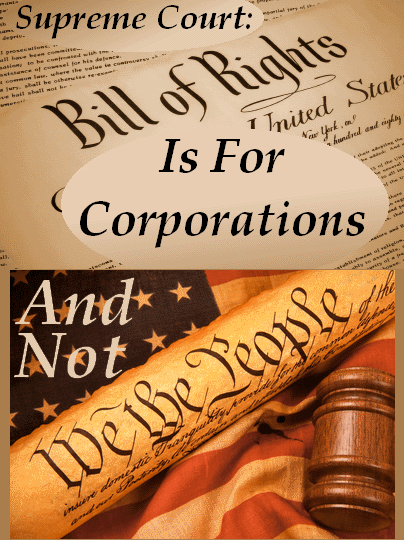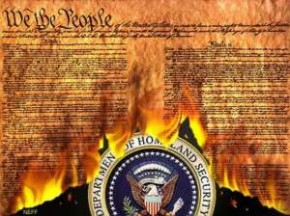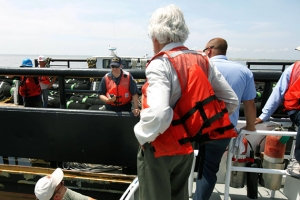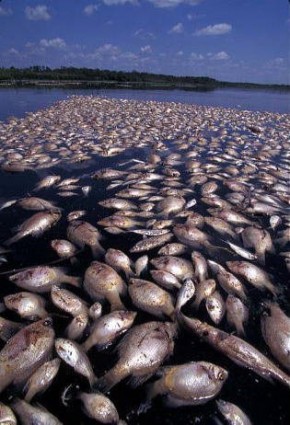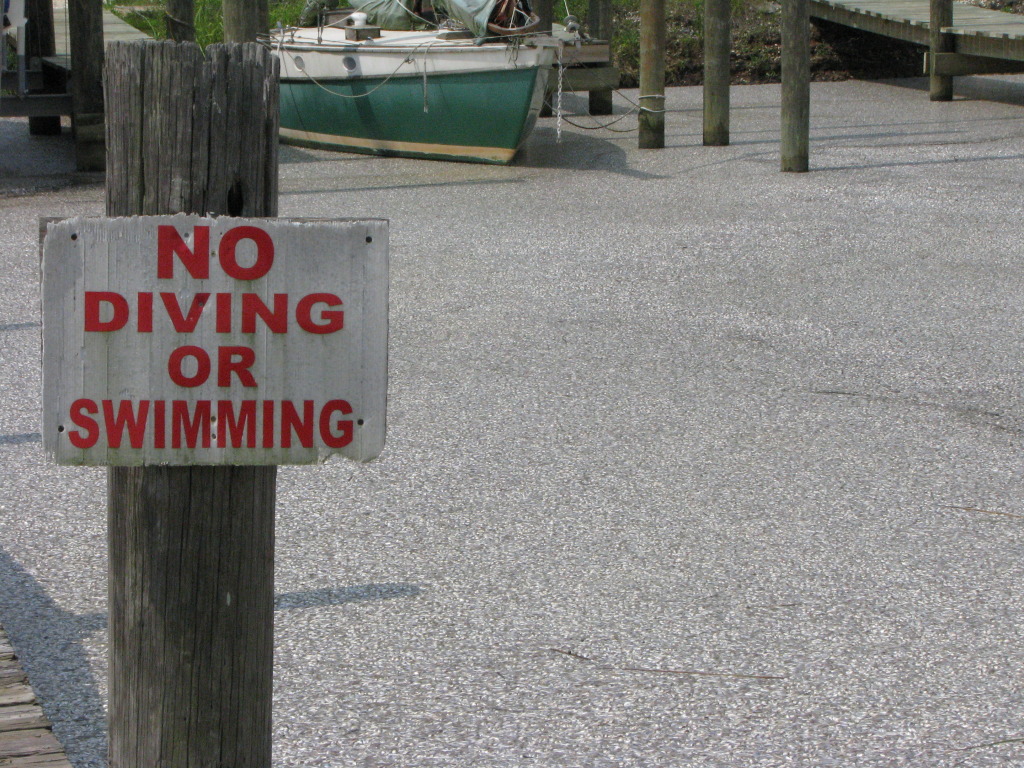Supreme Court Rules:U.S Constitution Only Protects Corporations Not Citizens
This is a must read for anyone who still believes in their rights as a citizen!
The US Constitution, Bill Of Rights And Freedom of Press
Our Founding Fathers shed their blood and lost their loved ones in the battle against evil tyranny during the American Revolution and afterward our Government was founded in the spirit of those who patriots who gave their lives so we could all be free. In that spirit the framework of our Constitution was forged on the very foundation that We The People had certain inalienable rights that the Government may never infringe upon lest we become subject to the same evil tyranny the Founding Fathers revolted against.
Those rights were engraved in our Bill of Rights, the first ten amendments, rights the Government was never supposed to take from us but continue to do so on an ongoing basis. The First Amendment points out the rights of We The People that our Founding Fathers decided should be protected above all else.
First Amendment –
Congress shall make no law respecting an establishment of religion, or prohibiting the free exercise thereof; or abridging the freedom of speech, or of the press; or the right of the people peaceably to assemble, and to petition the Government for a redress of grievances.
First and foremost on the list was the Freedom of Religion followed by the Freedom of the Press and the Freedom of speech. Also included in the First Amendment is the Freedom To Protest and the right to petition.
The Freedom of Press is second on the list because it is the only utility that helps to keep a rogue Government like the one we have here in the United States in check.
Freedom of the press is the freedom of communication and expression through vehicles including various electronic media and published materials. While such freedom mostly implies the absence of interference from an overreaching state, its preservation may be sought through constitutional or other legal protections.
Source: WikiPedia – Freedom of Press
And clearly case law in the United States covers includes blogs and alternative media into Freedom of Press Protections.
Freedom of the press in the United States
Freedom of the press in the United States is protected by the First Amendment to the United States Constitution. This clause is generally understood as prohibiting the government from interfering with the printing and distribution of information or opinions, although freedom of the press, like freedom of speech, is subject to some restrictions, such as defamation law and copyright law.
In Lovell v. City of Griffin, Chief Justice Hughes defined the press as, “every sort of publication which affords a vehicle of information and opinion.”[1] This includes everything from newspapers to blogs.
[...]
Source: WikiPedia — Freedom Of Press In The United States
Supreme Court In NJ Rules Freedom Of Press Applies To Corporations, Not We The People
Yet the Supreme Court in NJ has upheld a lower courts ruling that this fundamental right of our constitution does not apply to “We The People” but only to corporations that run Government censored news articles.
NJ Supreme Court: Online posters don’t have same source protections as mainstream journalists
By Associated Press, Published: June 7
TRENTON, N.J. — The New Jersey Supreme Court says people posting in online message boards don’t have the same protections for sources as mainstream journalists.
The court ruled Tuesday that New Jersey’s shield law for journalists does not apply to such message boards.
[...]
Source: Associated Press via The Washington Post
Of course our beloved corporate media would lead the unsuspecting public to believe the ruling only status people posting on message boards don’t count as journalists. Except that is not what the ruling is about. The ruling declares that bloggers and citizens journalists, such us myself and other alternative media reports, aren’t entitled to the constitutional protections of the Freedom Of Press.
N.J.: No shield protection for bloggers
The latest chapter in the never-ending story – aka “journalist versus blogger – took a new turn on Tuesday when New Jersey’s Supreme Court ruled that bloggers and online posters don’t have the same protections for sources as mainstream journalists.
In this case, the court determined that New Jersey’s shield law for journalists does not extend to online message boards. The case centers around a New Jersey-based software company called Too Much Media, which sued a Washington state blogger for defamation and wanted her to reveal her sources used on message board posts.
The blogger, Shellee Hale posted comments about the company on her website, Pornafia in connection with a story she was preparing about porn. A lower court ruled in 2009 that she was not entitled to shield law protection and an appellate panel upheld that decision later that year.
In his ruling, Superior Court Judge Louis Locascio wrote that the courts “are now being faced with the task of evaluating a virtually limitless number of people who claim to be ‘reporting’ on issues, but who are, many times, doing little more than shouting from a digital soap box.”
Hale, who works as a private investigator in Washington state, wrote that Too Much Media engaged in fraud and “illegal and unethical use of technology.” She also claimed that the company’s principals “may threaten your life if you report any of the specifics.”
In concluding that Hale doesn’t rate protection under the state shield law, New Jersey’s high court has reopened a debate about who should be described as a “journalist.” What with the increase in citizen journalism – a trend on display during the “Arab spring” movement, where bloggers put their lives in danger to report the news – that decision is likely to strike more than a few as being behind the times.
Source: CBS News
While CBS clearly states the ruling includes bloggers, the real issue here is only revealed when looking at the lower court ruling that was upheld.
Blogger Sued For Defamation Can’t Invoke Shield Law, Says N.J. Judge
A blogger sued for her online criticism of a software company on a porn industry message board cannot invoke New Jersey’s press shield law, a Monmouth County judge says in a case of first impression in the state.
Superior Court Judge Louis Locascio’s June 30 ruling allows the company, Too Much Media, to ask blogger Shellee Hale the sources for comments she posted on Oprano, a Web site that proclaims itself the “Wall Street Journal of porn.”
Locascio also made a second novel ruling in the case, Too Much Media LLC v. Hale, MON-L-2736-08, holding the company can pursue damages even without a showing of pecuniary loss, based on postings that accuse it of criminal conduct and business incompetence.
In denying Hale protection as a journalist, Locascio said courts “are now being faced with the task of evaluating a virtually limitless number of people who claim to be ‘reporting’ on issues, but who are, many times, doing little more than shouting from a digital soap box.”
Hale, of Washington state, has a private investigator’s license and a degree in respiratory therapy but not one in journalism. She operates two Web sites, camandago.com and coachshellee.com, on which she offers her services as a “life coach,” fitness adviser and freelance investigative journalist, and also keeps a blog, shelleehale.net/blog.
[...]
Though calling New Jersey’s shield law one of the nation’s broadest, Locascio denied Hale’s motion because she failed to make a prima facie case that she was connected with the news media. The law protects persons “engaged on, engaged in, connected with, or employed by news media for the purpose of gathering, procuring, transmitting, compiling, editing or disseminating news for the general public.”
Locascio found no evidence Hale ever worked for a newspaper, magazine or media entity. He discounted as a “sham affidavit, entitled to no credence” her certification saying she had published articles in one newspaper and several trade journals because she did not provide specifics and she lied in a prior certification concerning a jurisdictional motion, when she denied any knowledge of the plaintiff’s residence or domicile.
So there we have it, the Supreme court ruling clearly sates since there is no evidence of Hale being a journalist for the fascist corporate media the certification that you are entitled to partake in the Free Press and be entitled to Freedom of Press Constitutional protections are “entitled to no credence”.
Our Founding Fathers And The Freedom Of Press
Perhaps none of the Founding Father’s was more adamant about the Freedom of Press in America than Benjamin Franklin.
“I shall not burn my press and melt my letters”
Newspaper publishing in the days of Ben Franklin and his grandson was a filthy, grinding business. Fighting for freedom of the press was an even more wretched a task.
By David Talbot
Sep 2, 2003 | Benjamin Franklin created America’s free press, but it was his beloved grandson, Benjamin Franklin Bache, who fought and died to give it life. The story of these two remarkable early Americans raises questions that are still relevant today: How do you keep alive an independent press? Should the media be guided by a spirit of impartiality or partisanship? Should journalists risk aggressively crusading against a presidency if they feel it’s threatening the values and well-being of the nation? Though they were both ardent democrats and critics of government by elites, Franklin and his grandson embraced different answers to these questions. And the American media today is similarly divided as it struggles to sort out these issues.
Ben Franklin’s Pennsylvania Gazette, which he began publishing in Philadelphia in 1729 at the age of 23, was in many ways the first modern American newspaper. It combined news and opinion along with gossip, sex advice and sensationalistic crime coverage. A man of the Enlightenment with no patience for puritanical repressiveness, Franklin reveled in producing a popular paper that not only reflected his progressive politics but his earthy — and occasionally bawdy — sensibility.
But as a newspaper publisher, Franklin was no crusader. The early American press was financially fragile, dependent on a small reader and commercial base. “Printers” — as publishers were called, since most of them combined editorial duties with the grueling, dirty and literally stinking job of working the hand press (the sheepskin balls used to ink the type were soaked in urine and wrung out by hand) — could not afford to offend too many of their customers and advertisers. So Franklin, the apostle of sound business practices, relied on his sly wit and hid behind fictitious bylines to make his points.
Still, Franklin was often, in his words, “censured and condemned by different Persons for printing things which they say ought not to be printed.” On May 27, 1731, in response to his critics, the young newspaperman published his famous Gazette editorial, “Apology for Printers,” — which, observes Walter Isaacson in his excellent biography, “remains one of the best and most forceful defenses of a free press.” The press Franklin championed in his wry and incisive essay was not a passionate partisan, but one that was open to a variety of clashing viewpoints, which might or might not reflect those of the publisher. Publishing was a trade, just like shoemaking or carpentry, Franklin pointed out — but the stuff of printing was not boots or benches, it was “mens’ opinions,” which “are almost as various as their Faces.” And “if all Printers were determined not to print any thing till they were sure it would offend no body, there would be very little printed.”
[...]
Source: Salon
In fact Benjamin Franklin considered himself above all else a Journalist and it was in fact his style of journalism that led to the modern American newspaper.
Although Ben Franklin excelled as a businessman, scientist, diplomat, and inventor, he considered himself, first and foremost, a printer and publisher. As publisher of the Pennsylvania Gazette, Franklin established a style of journalism that became the foundation for modern American news coverage.
Journalist Walter Isaacson believes that Franklin’s success with the Pennsylvania Gazette can be attributed in great part to Franklin’s desire to examine more than one side of an issue and to publish different points of view. Isaacson states, “Franklin is one of the first American publishers to understand that freedom of the press and tolerance are part of what it is to be a newspaper editor, and what it is to be a printer. And part of the genius of America is that we’re open in our discourse.”
Franklin was once criticized for printing something that went against the prevailing point of view. Franklin believed that he should print the truth, even if it was unpopular. Isaacson tells how Franklin responded to this criticism with an article in the Gazette “called ‘Apology For Printers’ where he writes, ‘when truth and error have fair play, the former is always an overmatch for the latter.’”
Isaacson says, “All of us in journalism get criticized for some of the things we print. And you always look back to Franklin’s ‘Apology For Printers,’ where he justifies trying hard to give all sides to a story, not to be narrow in its view. That’s the spirit of the open press in America. That’s what you try to do in journalism, and that’s why a free and open press is so important to this country.”
Source: PBS
Clearly Benjamin Franklin and the Founding Fathers advocated for a free and open press. To point out how passionate about the Freedom of Press here is a poem he published in the Poor Richard’s Almanack.
ON THE FREEDOM OF THE PRESS
by: Benjamin Franklin (1706-1790)
HILE free from Force the Press remains,
Virtue and Freedom chear our Plains,
And Learning Largesses bestows,
And keeps unlicens’d open House.
We to the Nation’s publick Mart
Our Works of Wit, and Schemes of Art,
And philosophic Goods, this Way,
Like Water carriage, cheap convey.
This Tree which Knowledge so affords,
Inquisitors with flaming swords
From Lay-Approach with Zeal defend,
Lest their own Paradise should end.The Press from her fecundous Womb
Brought forth the Arts of Greece and Rome;
Her offspring, skill’d in Logic War,
Truth’s Banner wav’d in open Air;
The Monster Superstition fled,
And hid in Shades in Gorgon Head;
And awless Pow’r, the long kept Field,
By Reason quell’d, was forc’d to yield.This Nurse of Arts, and Freedom’s Fence,
To chain, is Treason against Sense:
And Liberty, thy thousand Tongues
None silence who design no Wrongs;
For those who use the Gag’s Restraint,
First Rob, before they stop Complaint.“On the Freedom of the Press” is reprinted from Poor Richard’s Almanack, 1757.
Source:The Poetry Archive
Government Censorship of the Corporate Media
Clearly the spirit of the press was to be free and open, for anyone to be allowed to participate in order to keep the Government in check. Instead we live in a world were corporate news reporters echo statements from Government officials and other Corporations without holding their statements to slightest burden of being factual.
Case in point, BP and Government censored coverage of the BP Gulf Oil Spill.
1st Amendment Suspended; BP Gulf Oil Spill Coverup Now Violates US Constitution And Bill of Rights
The Federal Government has effectively suspended the 1st Amendment by issuing an order that bans all media access to spill, boom, cleanup sites and workers under threat of felony charges and a $40,000 fine.While we have seen the media blackout evolve over the course of the disaster in the Gulf the latest ban is especially alarming. With the issuance of the ban the coverup of the BP Gulf Oil Spill now directly violates the Constitution and the Bill of Rights and the alarming part is that they aren’t even hiding it.
In case you have forgotten, here is the text of the First Amendment of the US Constitution which is a part of the Bill of Rights.
CNN’s Coverage.
From Newsweek.
BP’s Photo Blockade of the Gulf Oil Spill
Photographers say BP and government officials are preventing them from documenting the impact of the Deepwater Horizon disaster.
Gerald Herbert / APJean-Michel Cousteau (center) was turned away from a wildlife sanctuary by the U.S. Coast Guard after they discovered that an AP photographer was on board.As BP makes its latest attempt to plug its gushing oil well, news photographers are complaining that their efforts to document the slow-motion disaster in the Gulf of Mexico are being thwarted by local and federal officials—working with BP—who are blocking access to the sites where the effects of the spill are most visible. More than a month into the disaster, a host of anecdotal evidence is emerging from reporters, photographers, and TV crews in which BP and Coast Guard officials explicitly target members of the media, restricting and denying them access to oil-covered beaches, staging areas for clean-up efforts, and even flyovers.
Last week, a CBS TV crew was threatened with arrest when attempting to film an oil-covered beach. On Monday, Mother Jones published this firsthand account of one reporter’s repeated attempts to gain access to clean-up operations on oil-soaked beaches, and the telling response of local law enforcement. The latest instance of denied press access comes from Belle Chasse, La.-based Southern Seaplane Inc., which was scheduled to take a New Orleans Times-Picayune photographer for a flyover on Tuesday afternoon, and says it was denied permission once BP officials learned that a member of the press would be on board.
“We are not at liberty to fly media, journalists, photographers, or scientists,” the company said in a letter it sent on Tuesday to Sen. David Vitter (R-La.). “We strongly feel that the reason for this massive [temporary flight restriction] is that BP wants to control their exposure to the press.”
The ability to document a disaster, particularly through images, is key to focusing the nation’s attention on it, and the resulting clean-up efforts. Within days of the 1989 Exxon Valdez spill, pictures of dead otters, fish, and birds, as well as oil-covered shorelines, ignited nationwide outrage and led to a backlash against Exxon. Consumers returned some 10,000 of Exxon’s 7 million credit cards. Forty days after the spill, protestors organized a national boycott of Exxon. So far, no national boycott of BP is in the works, despite growing frustration over the company’s inability to cap the leaking well. Obviously, pictures are emerging from this spill, but much of the images are coming from BP and government sources.
[...]
Source: Newsweek
Where The Mainstream Media Falls Short The Free Independent Press Steps Up
Of course the suspension of the First Amendment stopped the media from covering the spill it was bloggers and independent citizen journalists who kept the coverage going.
BP Gulf Oil Spill Photos Show What BP Doesn’t Want You To See, The Real Reason Constitution Has Been Suspended
Washington’s blog points us to the photos below showing just why BP and the Federal Government have suspended the constitution and has made it a felony crime punishable by jail time and a $40,000 fine for anyone that approaches boom, spill, workers or clean up vessels.The pure devastation in the photos clearly show what BP doesn’t want you to see which is also the reason for the BP ran No-Fly zone over the BP Gulf Oil Spill. The Bottom line the Federal Government and BP has decided it is not in their best interests to allow too many people keep seeing a steady stream of photos like the ones below.
Until the no-fly zone and the ban on boom, spill, workers and clean up vessels is lifted we just may not see too many more photos like these.
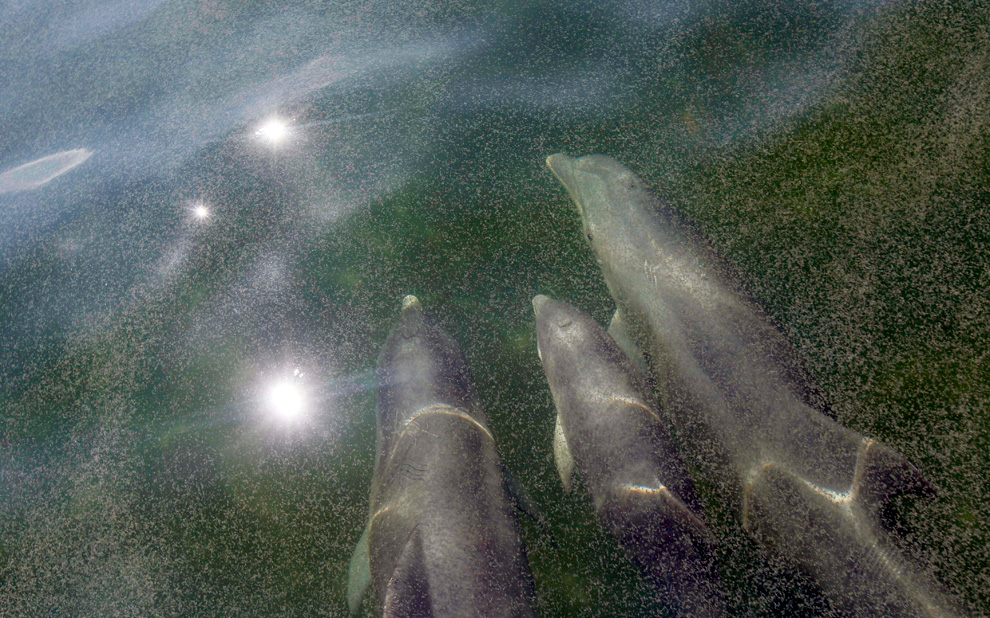
A pod of Bottlenose dolphins swim under the oily water Chandeleur Sound, Louisiana, Thursday, May 6, 2010 in the Gulf of Mexico. (AP Photo/Alex Brandon)
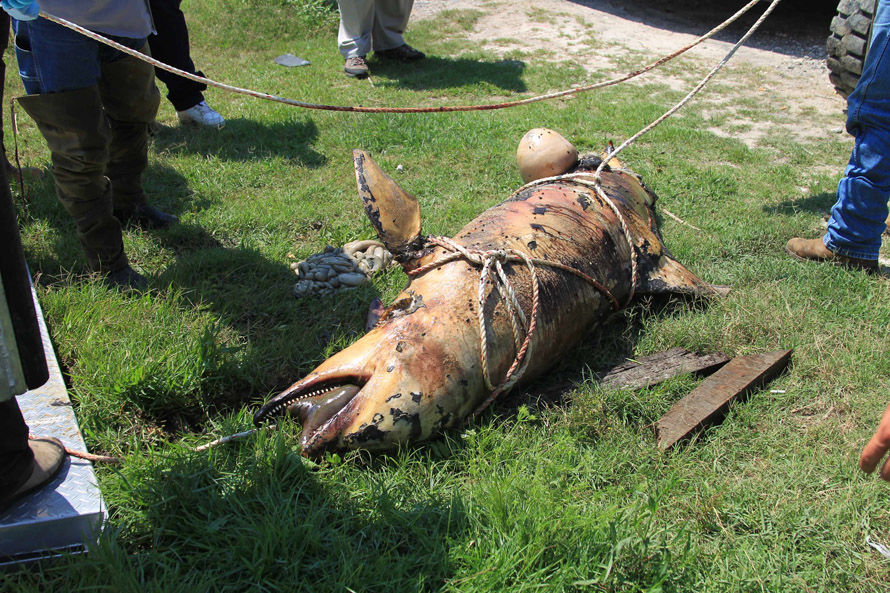
This is a photo of a dolphin pulled from the gulf….
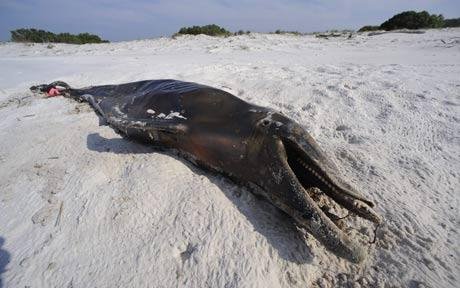
Below you will find a picture of millions of dead fish. These are small fish, possible baby fish. They are slowly washing ashore and towards the ports. Over 9,000 species of animals will be under threat of extinction in this region, we might not ever see again on the planet. Click the image to enlarge it.
No that’s not asphalt… its millions of dead fish.
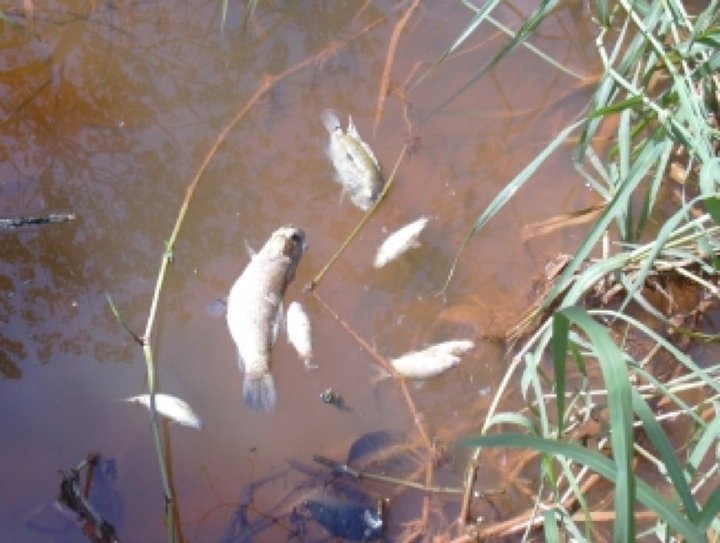
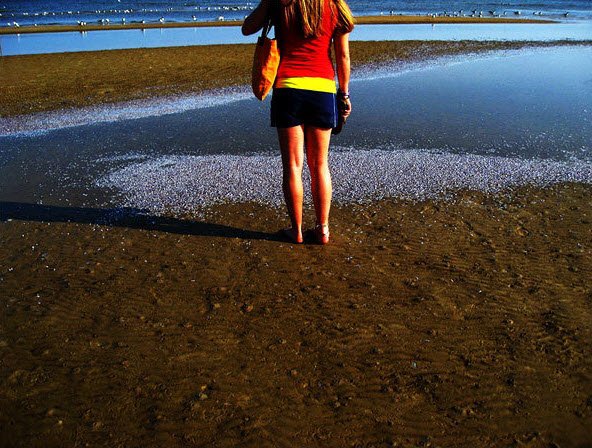
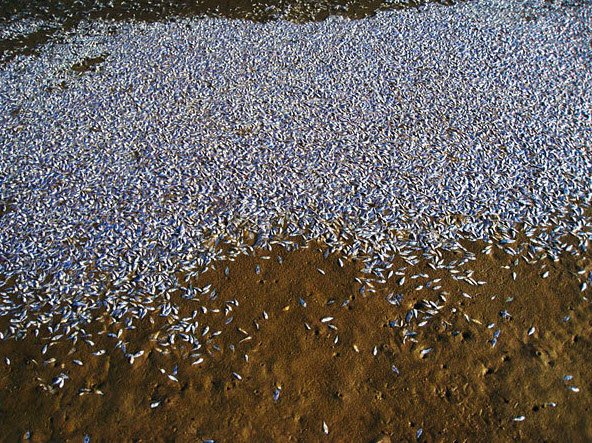
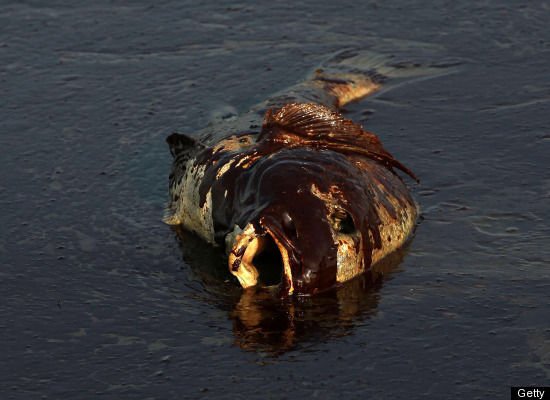
Of course the coverage didn’t start or stop there.
NPR Confirms: 70,000 Barrels A Day – One Exxon Valdez Spill Every 4 days – Leaking In Gulf Oil Spill
Finally, a scientific analysis has been done on the video from BP, after I suggested the videos show proof that Government was concealing the amount of oil leaking into the Gulf of Mexico. Scientific analysis confirms that at least 70,000 barrels of oil a day are leaking in the Gulf oil spill. That’s an Exxon Valdez spill every 4 days.
NPR has learned that much more oil, 70,000 barrels a day or more than ten times the official estimate, is gushing into the Gulf of Mexico from the Deepwater Horizon pipe, based on scientific analysis of the video released Wednesday.
That’s the equivalent of one Exxon Valdez tanker full every four days.
I repeat one Exxon Valdez tanker full of oil is leaking into the Gulf of Mexico every four days. That 70,000 barrel per day number is much higher than the official Government reported number and is even higher the worse case number BP gave to congress.
…
It was really a no brainer. According to Government reports only 3/4 of a gallon where leaking per second in each of the 3 leaks. But watch the video below. It is cleat that we are talking about way more than just 3/4 of a gallon of oil per second. And this is only a single leak.
…
A little vindication after being made to feel stupid for the last few days.
Also, a big thanks to the scientists and NPR who found that my claims had merit and performed the scientific analysis on the videos. I am assuming that it was Alun Lewis, a British oil-spill consultant who first took the videos seriously, according The New York Times:
Mr. Lewis cited a video of the gushing oil pipe that was released on Wednesday. He noted that the government’s estimate would equate to a flow rate of about 146 gallons a minute. (A garden hose flows at about 10 gallons per minute.)
“Just anybody looking at that video would probably come to the conclusion that there’s more,” Mr. Lewis said.
Another thanks to the individual who submitted the links to NPR in the first place and asked if they could perform a scientific review.
Finally a big thanks to SkyTruth.org and Ian R. MacDonald, an oceanographer at Florida State University who have been outspoken critics of the Government supplied numbers. Without their ongoing challenges of the data being provided by NOAA and BP, and their expert analysis of satellite images to analyze environmental disasters, we would all still be in the dark.
So there you have it. One of the biggest stories that broke out during the BP Gulf Oil Spill – the cover up by BP and the Government about the of the amount of oil leaking from the Macondo well – reported by myself and other bloggers who made convincing arguments that scientists verified.
Now if that doesn’t fit the criteria that bloggers are “engaged on, engaged in, connected with, or employed by news media for the purpose of gathering, procuring, transmitting, compiling, editing or disseminating news for the general public” then I don’t know what does?
How about Radioactive Fukushima Plutonium And Strontium Bombarding US West Coast Since March 18th. Maybe Radiation Found In San Francisco, CA Tap Water — Rainwater Radiation 18,100% Above Drinking Water Limit or Confirmed: EPA Rigged RADNET Japan Nuclear Radiation Monitoring Equipment To Report Lower Levels Of Fukushima Fallout.
All stories ignored by the corporate media and covered extensively by bloggers, citizen journalists and the alternative media.
The Supreme Court ruling that somehow the Bill of Rights and the US Constitution doesn’t apply to We The People unless we are somehow connected to or financed by corporation is nothing short of dictated fascism.
Short URL: http://www.myweathertech.com/?p=1777

